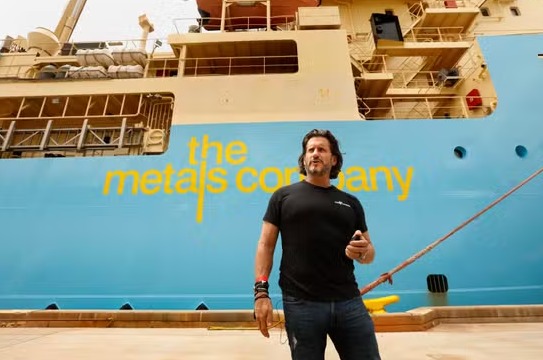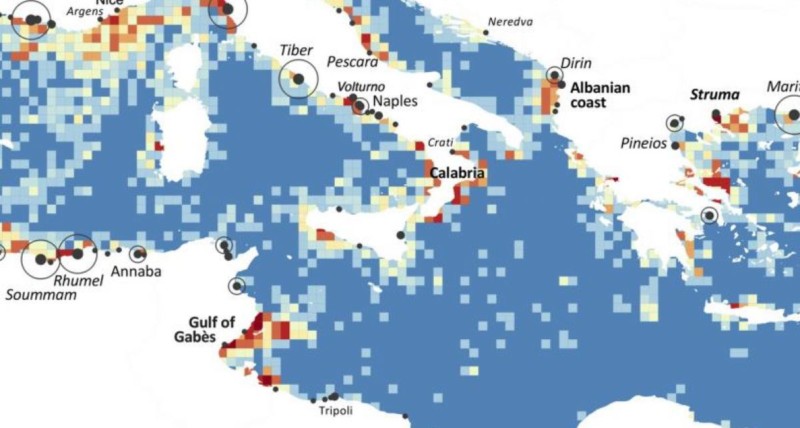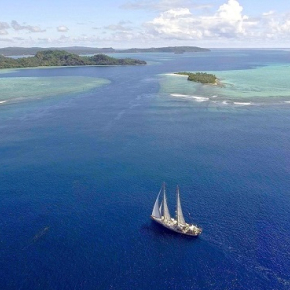July 24, 2025
The company dazzles investors with the promise of profits from minerals hidden deep under the ocean and is pushing hard to obtain an exploitation license, despite environmental risks. But the technical feasibility and profitability of such an activity remain highly questionable.
Gerard Barron is almost always seen holding a polymetallic nodule — either showcasing one of those black pebbles extracted from the abyssal plains during interviews or constantly turning it in his hands while presenting The Metals Company (TMC), the mining company where he serves as CEO. The Australian in his fifties, with long hair and large black-framed glasses, is selling a dream to investors: to profit from metals like cobalt and nickel lying on the ocean floor, essential for battery manufacturing. Listed on the stock exchange since 2021, TMC will “undoubtedly” be the first company to mine the seabed in international waters — which belong to no single state — Barron stated in early June.
Founded in 2011 under the name DeepGreen Metals and based in Vancouver, the company has been promising the start of production for years. These promises have repeatedly been postponed, despite pressure TMC exerts on the International Seabed Authority (ISA), the body tasked with negotiating the mining code that will regulate seabed exploitation in international waters. The ISA is meeting again from July 21 to 25 in Kingston, Jamaica.
Amid concerns for deep-sea ecosystems, about thirty countries are advocating for a moratorium — a precautionary pause — or even, as France suggests, a complete ban. TMC has chosen to bypass these slow-moving multilateral negotiations: in late April, its U.S. subsidiary applied for a commercial exploitation license from the United States government, which is not a member of the ISA. The application concerns the « Clarion-Clipperton Zone, » a vast area of the Pacific between Hawaii and Mexico, where TMC has already conducted explorations with ISA approval, thanks to sponsorship from the island nation of Nauru.
Will this authorization, granted to its subsidiary Nori, be renewed when it expires in 2026? On Monday, July 21, the ISA Council — comprising 36 countries among the 169 member states — adopted a decision asking its Legal and Technical Commission to give « particular attention » to potential violations of the multilateral legal framework by entities holding such exploration contracts.
A Very Public CEO
The exact geographic area targeted by TMC in its U.S. application is not public. The company declined to share this with Le Monde. The small company, which reported having 47 « employees and contractors » as of December, also refused to answer questions from Le Monde regarding its history and operations. Yet it is far from media-shy. Gerard Barron, CEO since 2017, frequently appears in mining and financial media. For years, this entrepreneur — who has a background in advertising — has promoted deep-sea mining. He was even an early investor in Nautilus Minerals, a pioneering company that tried to mine copper, gold, and zinc off the coast of Papua New Guinea.
That venture went bankrupt in 2019 after running out of funds and facing strong opposition from local communities and environmental groups — long before it could achieve its goals. Barron had already exited by then. In many ways, TMC is the heir to this “complete failure,” according to local authorities who had invested in the project. TMC was founded by David Heydon, the same founder of Nautilus Minerals, with Barron contributing from the beginning to the company’s strategic development and financing. TMC also acquired some of Nautilus’ former subsidiaries, which held ISA exploration contracts.
Will it fail again? “TMC had to act quickly in recent months to avoid running out of cash,” said Andy Whitmore, financial advocacy coordinator for the Deep Sea Mining Campaign, a coalition of environmental NGOs. Since 2022, the Canadian company has faced numerous setbacks. It received three non-compliance warnings from Nasdaq for trading below $1 per share. Several historic partners and investors, such as Maersk — the world’s second-largest shipping company — have since pulled out. Maersk confirmed to Le Monde that it sold all its shares in 2023.
“America First”
With Donald Trump’s return to power, The Metals Company is capitalizing on the U.S. president’s “America First” rhetoric. The company emphasizes the U.S. dependency on rivals — especially China — for critical minerals. In mid-November, shortly after the Republican victory, TMC welcomed Trump’s appointment of “strong supporters of nodules,” such as Marco Rubio as Secretary of State. It has also aligned itself with Trump’s inner circle, naming celebrity lawyer Alex Spiro — who has represented Elon Musk — to its board of directors on June 16.
The executive order signed by Trump in mid-April, urging federal agencies to speed up review and approval processes for commercial seabed mining in international waters, had a noticeable market effect: TMC’s share price jumped from $1.66 in early April to $7.90 by mid-July — with a market capitalization of $2.8 billion. During this time, the company attracted new investment, including from South Korean refiner Korea Zinc.
However, its viability remains uncertain. “It’s difficult to see how the project could be economically viable,” said Emmanuel Hache, Director of Research at the French Institute for International and Strategic Affairs (IRIS) and an expert on resource economics. Among the concerns: high operational costs and the volatile prices of target metals like nickel, which are significantly lower than during the 2022–2023 peak.
TMC also relies on external partners, notably its shareholder Allseas, whose vessel enabled the first nodule collection test in 2022. Iceberg Research, an analysis firm, points to other weaknesses — such as the ongoing absence of a preliminary feasibility study, which is considered essential in the mining industry to validate a project’s potential.
Underestimated Biodiversity
Beyond economic doubts, environmental concerns persist. Many NGOs fear irreversible damage to little-known deep-sea ecosystems. While the company funds some scientific studies, questions remain about the credibility of the results and methodologies used.
Jeffrey Drazen, an oceanographer from the University of Hawaii, has participated in several TMC-funded studies on deep-sea species and the potential impacts of nodule extraction. He notes that biodiversity in these zones is underestimated and stresses the importance of better understanding deep-sea life before launching full-scale mining. Drazen observed the company’s urgency: “These are two worlds clashing — their fast-paced, commercially driven timeline does not align with the time required for thorough scientific research.”
Until 2024, TMC’s relationship with the ISA was relatively cordial. Then-secretary-general Michael Lodge, a British lawyer whose ties to the industry had raised questions, even appeared in a 2018 promotional video for TMC, unearthed by the Los Angeles Times. Today, the tone has shifted. Lodge’s successor, Leticia Carvalho, expressed “deep concern” over TMC’s U.S. strategy. The company retorts that the ISA is being influenced by “a faction of states aligned with environmental NGOs” delaying the mining code’s adoption.
Even if the U.S. grants a license, doubts remain about TMC’s ability to extract and process nodules on a large scale. Initially reliant on Japanese partners, the company now promotes building an entire industrial ecosystem in the United States — a bold pivot that could further complicate Gerard Barron’s ambitions.
But one thing is certain: he won’t stop squeezing those black stones anytime soon.




